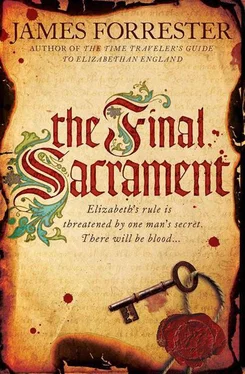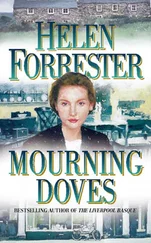James Forrester - Final Sacrament
Здесь есть возможность читать онлайн «James Forrester - Final Sacrament» весь текст электронной книги совершенно бесплатно (целиком полную версию без сокращений). В некоторых случаях можно слушать аудио, скачать через торрент в формате fb2 и присутствует краткое содержание. Жанр: Исторический детектив, на английском языке. Описание произведения, (предисловие) а так же отзывы посетителей доступны на портале библиотеки ЛибКат.
- Название:Final Sacrament
- Автор:
- Жанр:
- Год:неизвестен
- ISBN:нет данных
- Рейтинг книги:5 / 5. Голосов: 1
-
Избранное:Добавить в избранное
- Отзывы:
-
Ваша оценка:
- 100
- 1
- 2
- 3
- 4
- 5
Final Sacrament: краткое содержание, описание и аннотация
Предлагаем к чтению аннотацию, описание, краткое содержание или предисловие (зависит от того, что написал сам автор книги «Final Sacrament»). Если вы не нашли необходимую информацию о книге — напишите в комментариях, мы постараемся отыскать её.
Final Sacrament — читать онлайн бесплатно полную книгу (весь текст) целиком
Ниже представлен текст книги, разбитый по страницам. Система сохранения места последней прочитанной страницы, позволяет с удобством читать онлайн бесплатно книгу «Final Sacrament», без необходимости каждый раз заново искать на чём Вы остановились. Поставьте закладку, и сможете в любой момент перейти на страницу, на которой закончили чтение.
Интервал:
Закладка:
Since then he had kept a record of the people who came and went from the house. They were almost all men. A woman brought two pails of water once a week on a yoke over her shoulders and stayed for about two hours each time. No other woman ever entered the building-not even as the companion of one of the men who lived there. Once he had seen his own stable boy, Nick, go into the house. That had greatly alarmed him. On being questioned, Nick had pleaded innocence-saying that he went there simply to borrow a hand saw. Clarenceux had banished him from the house, forcing him to sleep above the stables, and had prohibited him from speaking to the men again. He had no doubt that they were watching him, and that they were working for Francis Walsingham.
Despite there being a small fire in the hearth, he could still see the clouds his breath made in the cold air. He breathed on his fingers to warm them, then pulled out a sheet of paper hidden under a heavy leather-bound volume on the corner of the table. He dipped the newly cut quill into an open inkwell and marked two short downward strokes on the paper, one under a column marked “GrB” for “Greybeard” and the other under a column marked “ShF” representing the shortest of the men who came and went regularly and who had fair hair. He put the date in the right-hand column and waited. A few minutes later, the unpleasant old man who called himself Tom Green, and whom he had once encountered, left the building and started walking back east toward the city gate. Clarenceux turned the previous day’s line for “Tom Green” into a cross. He watched. No one else left. That meant there were three of Walsingham’s men in the house for the moment.
Clarenceux set down his quill. For four months it had been just one man changing stations on an irregular basis; for the last three weeks it had been two, every day. Something had happened. If the windows revealed that these men were watching him, their new pattern of attendance revealed that Walsingham was employing a different strategy, and that meant a different objective or different circumstances.
The door of the house just to the right opened and Mistress Knott stepped out. Her maidservant came with her, holding a wooden pail. While the maidservant started to clean the two steps up to the front door, Mistress Knott walked to the city with a scarf around her head and a basket under her arm. The Knotts were a Dutch couple originally called Annoot; they had come to London as refugees the previous year, fleeing the Spanish persecution of Protestants under the duke of Alva. Her husband was a physician of some fame. At first he had had great difficulty finding work, due to his lack of a license to practice in England, but things were better for them now. Mr. Knott had treated enough prominent people with sufficient success that his business and status were assured. Clarenceux had helped, finding out for himself how efficacious the Dutch physician’s remedies and cures could be and recommending “Mr. Knott” to his friends and acquaintances.
In the city, the bell of St. Martin le Grand began to ring nine o’clock. Then another chimed. A moment later, all the city churches began to ring the hour. Nearby, the great bell of St. Bride’s Church also clanged out. Clarenceux went back to studying the manuscript volume he was reading: the chronicle of Henry of Abingdon, which had been lent to him by Sir Richard Wenman. This was, as far as Sir Richard knew, the sole surviving manuscript. Clarenceux was sure Sir Richard was right; he had never heard of another copy. That it was unique was not surprising: Henry was a tedious writer, more concerned with ecclesiastical doctrine than people’s lives. Nothing gave him greater pleasure, it seemed, than recording at length the proceedings of the church council at Constance, which he had attended from 1415 to 1417. However, the chronicle also contained a wealth of information about the Lollard knights-the ardent gentlemen supporters of the church reformer, John Wyclif. Many Lollards had been imprisoned for heresy and some had been burned at the stake. Clarenceux could not help but reflect on the comparison with his own time, having seen, heard, and smelled the terrifying burnings of Protestant Christians under Queen Mary, just ten years ago.
Clarenceux was not reading Henry of Abingdon for the history of Lollardy, however. It was because he had been forced by his superior, Sir Gilbert Dethick, Garter King of Arms, to undertake a visitation of Oxfordshire after Christmas. This would entail an inspection of the rights of all the gentlemen in that country who claimed to be esquires: to determine whether or not they truly were entitled to bear a coat of arms. To establish that right, they needed to be able to demonstrate that they were descended from a knight. Henry of Abingdon had been a Warden of Merton College in Oxford; hence many of his Lollard knights came from Oxfordshire, presumably inspired by followers of Wyclif, who had been a teacher at the university.
Out of the corner of his eye, he saw the door to the spies’ house open. A tall, thin man with long hair left. Clarenceux marked the “ThLH” column of his paper accordingly, and returned to his chronicle.
Until the ringing of the next hour he made himself read the neat lines of Latin, his eyes skipping past justifications for the Church claiming certain revenues and fees, and the responsibilities of absent rectors and vicars to their parishioners; he was looking for names of prominent men. He had already found references to two marriages of Lollard knights, by which he could determine the legitimacy of a number of claimants to coats of arms. A salacious story about a knight and his retinue seeking accommodation at a nunnery and taking a fancy to one of the nuns, then abducting her and leaving her pregnant, was equally useful: illegitimacy ruled against inheriting a coat of arms. The various stories of how Lollards evaded their pursuers amused him. They had made use of natural features of the landscape: hiding in the boughs of trees in summer, above their pursuers’ heads, or under the surface of a river, breathing through a hollow pipe or bundle of reeds while a cap floated downstream, distracting the chasing men.
Between every passage his attention flicked across to the spies’ house.
When the hour was up, he placed a smooth horn ruler between the pages of the chronicle and closed it. He stood up and took off the thick robe he usually wore in his study in winter, and hung it on a peg projecting from a beam. Opening the door, he went down the wooden steps to the hall on the first floor, hearing the boards creaking beneath his weight. The staircase was old and needed replacing; the whole front of the building was somewhat warped and decrepit. He did not mind it that way; old things delighted him. The luxury items he had bought for the house after it was damaged by Francis Walsingham’s men three years earlier were mostly those that his wife, Awdrey, had demanded. The exception was the glass in the front windows: this was a rarity in any house, let alone one as old as this. It dated back to his first days as Clarenceux, when signs of ostentation had been important to him. These days he saved his money. He did not know when but he was sure that, sooner or later, there would be reason to call upon it. Too many people knew that he was the man who had once had possession of Lord Percy’s marriage agreement. The fact that it was no longer in his house meant nothing. He was the way to it. One day, he might have to flee with his family-might find his house set alight. That was what Walsingham’s spies were doing now: keeping watch on him and his house lest anyone take action to seize the chronicle. Hence his concern that the number of around-the-clock watchmen had increased.
Standing at the bottom of the stairs to his study, he gently closed the old wooden door. At the back of the house one of his daughters shrieked with laughter and he heard the maidservant, Joan, telling her to give something back. He smelled the oak wood burning slowly on the hearth, at the end of the hall. There were two chests, one on either side of the fireplace, with rich red carpets draped over them. Three new painted cloths that Awdrey had asked him to buy hung on the walls. In the middle of the hall was an oak refectory table that he had bought from a merchant who had taken it from the Dominican Friary at the time of the Dissolution. A small square looking glass and a new painting of Awdrey hung on either side of the door that led to the main staircase, which in turn led down to the front door. The looking glass was not as lavish as the beautiful round mirror he had once owned, and which Walsingham’s men had smashed-but then, he thought, there was less pleasure in looking at himself now. In two years’ time he would be fifty. Would he last those two extra years? He hoped so-he had his beautiful young wife to keep him going-but he knew he was not his former self. His hair was turning gray and he constantly felt tired. And there was something in his tiredness that told him he could no longer outrun his enemies. His right hip ached regularly. That was one of the reasons why he had started going to Giacomo Girolamo’s school of defense at the Belle Savage Inn.
Читать дальшеИнтервал:
Закладка:
Похожие книги на «Final Sacrament»
Представляем Вашему вниманию похожие книги на «Final Sacrament» списком для выбора. Мы отобрали схожую по названию и смыслу литературу в надежде предоставить читателям больше вариантов отыскать новые, интересные, ещё непрочитанные произведения.
Обсуждение, отзывы о книге «Final Sacrament» и просто собственные мнения читателей. Оставьте ваши комментарии, напишите, что Вы думаете о произведении, его смысле или главных героях. Укажите что конкретно понравилось, а что нет, и почему Вы так считаете.












